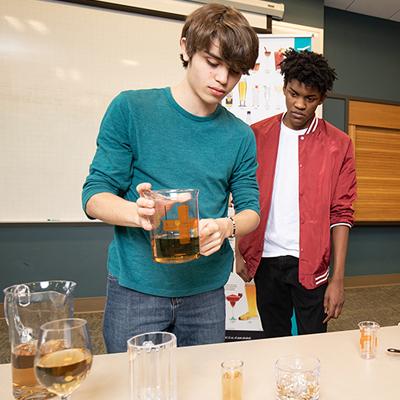Ensuring you’re teaching all aspects of alcohol impairment is important to educating youth.
When it comes to alcohol, understanding the effects on the bodies and minds of students and young adults is important. Alcohol impairment can have a large impact on both individuals and the communities we live in. By educating ourselves and our youth, we can make more informed choices and reduce the risks associated with alcohol consumption. Let’s take a look at a few aspects of educating about alcohol impairment in this blog.
Alcohol Impairment Awareness
Alcohol impairment affects the ability to think clearly, make decisions, and react appropriately to surroundings. This awareness is essential because the consequences of alcohol impairment can be severe and sometimes life-threatening. From vehicle crashes and injuries to poor judgment calls and risky behaviors, the impacts are wide-ranging. It’s important to teach students about the effect alcohol has on the brain and the body, the dangers of driving under the influence, long-term consequences, and legal repercussions.
Alcohol impairment begins at just one drink and can escalate in severity depending on the amount of alcohol in the system. Teaching what alcohol impairment looks like in yourself and others is important for young adults. Learn more about alcohol impairment awareness in this blog.
Understanding Blood Alcohol Concentration (BAC)
Blood Alcohol Concentration, or BAC for short, is a measure of the amount of alcohol in a person’s bloodstream. It’s typically expressed as a percentage. The higher the BAC, the more impaired a person becomes. Even small amounts of alcohol begin to affect one’s motor skills and cognitive functions. For instance, a BAC of 0.02% can result in a slight euphoria and loss of shyness, while a BAC of 0.08% (the legal limit for drivers of legal drinking age in most states) can cause poor muscle coordination, impaired judgment, and difficulty detecting danger.
Understanding BAC is crucial for students to understand that any amount of alcohol can have an effect and that zero alcohol is the only safe way to drive. Mixing alcohol with other substances is an additional danger and consideration when discussing BAC and the dangers of driving under the influence.
Educating Youth on Alcohol Impairment
Educating young people about alcohol impairment is one of the most effective ways to prevent the negative consequences associated with drinking. By starting a prevention and awareness campaign early, educators can start teaching students smart behaviors earlier and reinforce prior teachings. There are many methods and approaches educators can take; bringing in people who have experienced first-hand accounts of alcohol impairment and sharing their stories is a valuable way to teach the younger generation about the importance of alcohol awareness and responsible behaviors. Educators may also want to use posters, simulations, and statistics to educate youth. The role of parents and guardians is also an important aspect of preventing alcohol impairment in youth.
Starting these conversations early is vital and providing young people with accurate information and helping them understand the risks is part of that educational dialog. Role-playing scenarios and discussing peer pressure can empower them to make better choices. By normalizing discussions about alcohol and its effects, we can equip young adults with the knowledge and confidence to navigate social situations responsibly.
Preventing Alcohol Impairment
Preventing alcohol impairment starts with setting personal boundaries and sticking to them. Teaching younger students alternative activities to drinking at social events, strategies for avoiding peer pressure, and the importance of designated drivers or other safe transportation options are important to preventing alcohol impairment and legal consequences. Creating scenarios and acting out responses is a good way to help students practice saying no. It is also important to talk about how to handle and support a friend or family member who is struggling with alcohol addiction.
Alcohol Impairment and Mental Health
The link between alcohol use and mental health disorders, such as depression and anxiety, is significant and well-documented. Alcohol can exacerbate symptoms of mental illness and hinder treatment progress, creating a difficult cycle. It is important to develop coping mechanisms for managing mental health without relying on alcohol, as this can significantly improve overall well-being. Seeking professional help for co-occurring alcohol and mental health issues offers numerous benefits, providing tailored support and strategies for recovery. Additionally, adopting strategies for maintaining emotional sobriety and managing stress without alcohol can lead to a healthier, more balanced life.
Peer Pressure and Alcohol Impairment
Peer pressure is a powerful force, especially when it comes to alcohol consumption. It’s important to acknowledge and understand the pressure for students to drink in social situations. Teaching students how to assert boundaries and say no and showing them other alternatives for healthy habits can be a great way to reduce peer pressure around drinking. It’s also important to help students identify and avoid toxic relationships that push drinking, find strategies for standing up to peer pressure, and surround themselves with supportive friends.
Alcohol Impairment and Impacts on Relationships
Alcohol can significantly impact communication and conflict resolution in relationships, often leading to misunderstandings and increased tension. Addressing and overcoming alcohol-related issues is important for restoring a healthy relationship. Supporting a loved one with alcohol addiction can be difficult, but there are resources to help. Open and honest communication plays an important role in maintaining healthy relationships without alcohol by allowing transparency and understanding. Seeking help for alcohol-related relationship problems can provide valuable guidance and tools to navigate these challenges, ultimately strengthening the bond between partners.
Alcohol impairment is a serious issue that can affect anyone. Educators can help students and young adults make smart, informed decisions and foster a culture of responsibility by increasing awareness, understanding BAC, educating youth, preventing impairment, and handling peer pressure. Learn more about resources for educators on our Fatal Vision blog.






